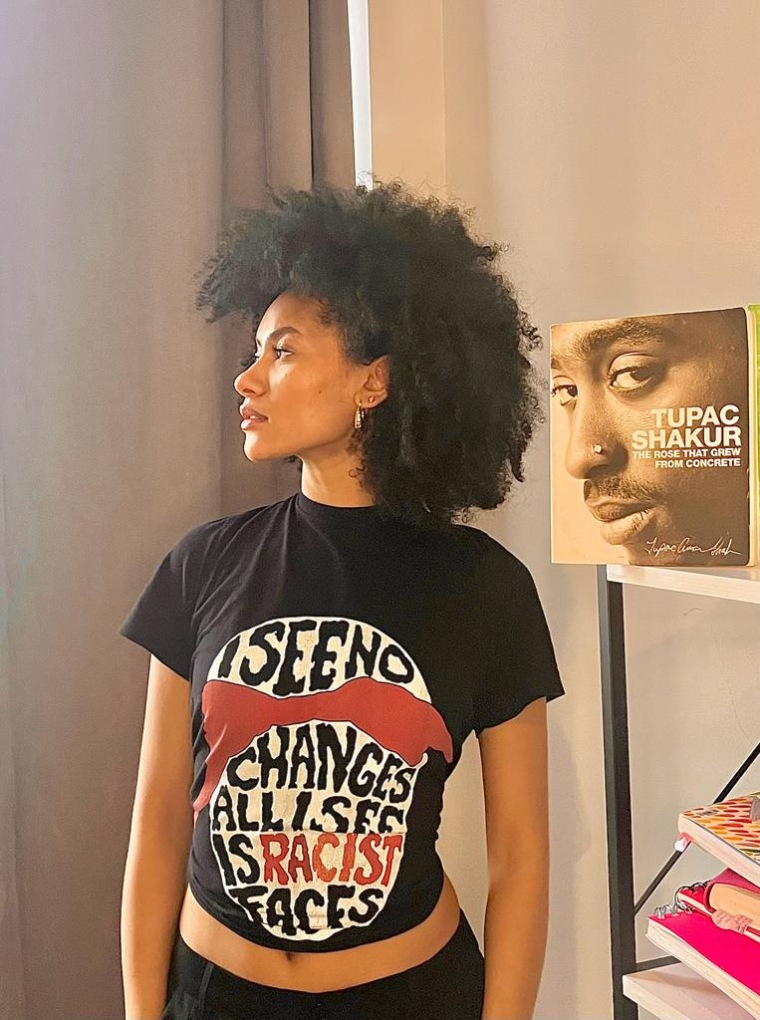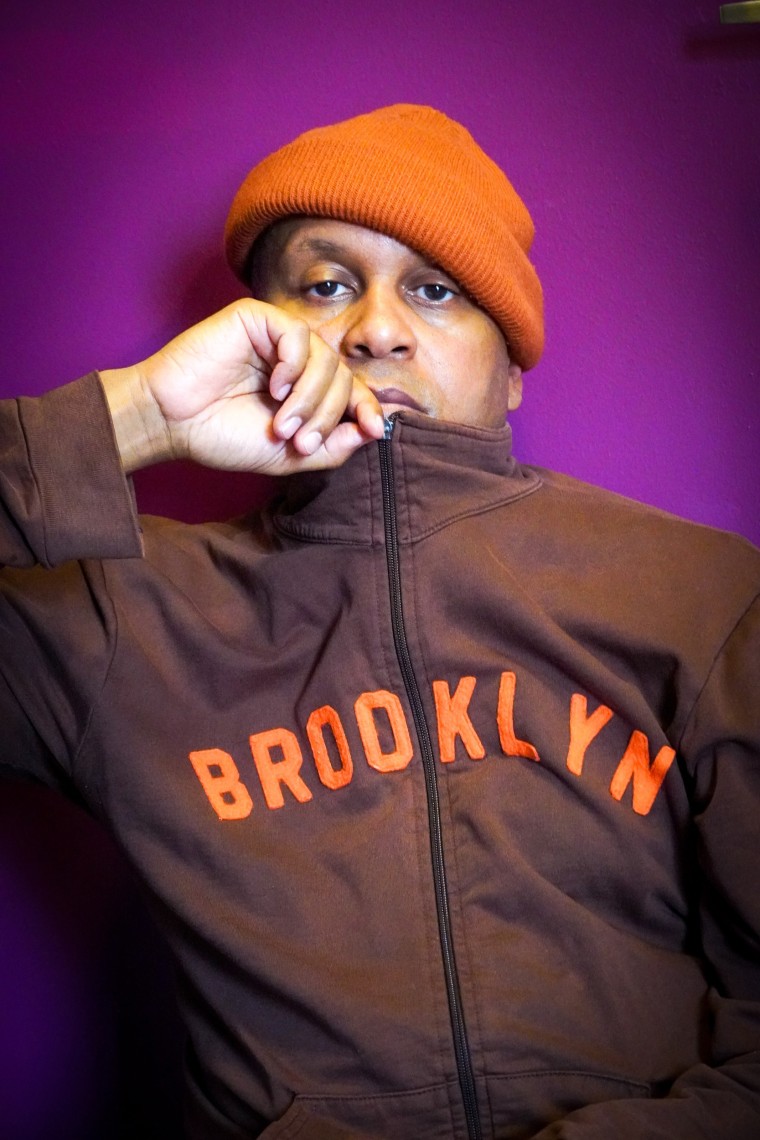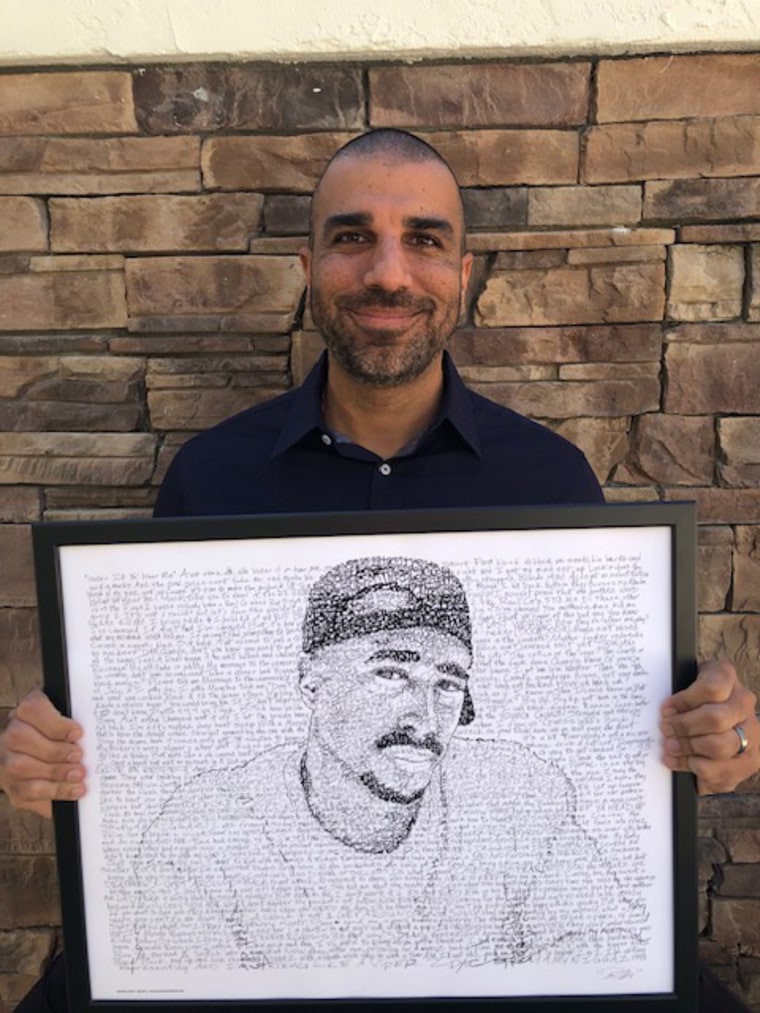
This article is more than
2 year old
|
At around 15, Allegria Di’lecarta found her style icon. Her teenage friends did not quite understand her new obsession. The icon — plastered on posters all over her room, his face emblazoned on her T-shirts — had famously been dead for decades. But Di’lecarta didn’t care. She took a deep dive into his music and declared that Tupac Shakur was it for her. Now 20 and living in East London, Di’lecarta keeps visual reminders of the artist, who will be forever 25; in a TikTok video celebrating her adoration for the rapper, she flaunts a phone case with an image of Tupac hugging his longtime friend Jada Pinkett Smith, and a backpack sporting a collage of Tupac faces. Di’lecarta said she often wears her Tupac backpack “so people know what I’m on.” 
has been a fan of Tupac since her teens. Courtesy Allegria Di’lecarta
But most notably, in September Las Vegas prosecutors arrested and charged Duane “Keffe D” Davis in connection with Shakur’s murder, finally yielding some answers in a decades-old homicide. As Davis’ case unfolds, Tupac’s influence and relevance in Black culture has remained as influential as it was at the peak of his career. This, experts and fans say, stems from his lyrics’ seeming timelessness, with his words about racism, police brutality, poverty and Black pride resonating with new generations. The way Shakur remarked on these and other social ills was “particularly poignant and remarkable,” said Barbod Salimi, a scholar who taught a class called “The Prophetic Witness of Tupac Shakur” at Boston University. His significance all these decades after his death, however, was no accident according to Shakur himself. 
biography on Tupac Shakur. Courtesy Evangeline Lawson
At the time, a little over a year before he was shot to death in Las Vegas, Shakur said he wanted to do the interview because it was only a matter of time before he was killed. And his legacy was on his mind. He had just survived being shot five times a few months prior. “God let me live for me to do something extremely extraordinary, and that’s what I have to do,” Tupac said to Powell. The rapper also said he felt “close” to Marvin Gaye, who was 44 when he was killed, and Vincent van Gogh due to how tormented they were, and because nobody appreciated van Gogh’s work until he was dead. “Now it’s worth millions,” he said. Powell wrote three cover stories about Tupac for Vibe in the 1990s. “Pac is not going anywhere,” said Powell, now a Grammy-nominated poet and author of 16 books, including an upcoming biography on Tupac. He likened the rapper’s legacy to that of President John F. Kennedy, who was assassinated 60 years ago in November. They were both larger than life, “bigger than the generation of the times that they lived in — and they speak to us in different ways beyond whenever they were alive.” Social media has played an important part in spreading Shakur’s music and message and expanding his legacy. On TikTok alone, #2pac has 9.3 billion views. His official YouTube channel has more than 3 billion views and 7.36 million subscribers. Tupac’s style and boldness, Di’lecarta said, has had a significant effect on young people. “Being a Black British person and a part of Gen Z, like, my interest in him was almost weird,” said Di’lecarta, who is an aspiring actor. “I was genuinely seen as kind of a bit weird because I love this guy so much.” 
Two years later, Phillips’ mother gave him Shakur’s 1995 CD “Me Against the World.” He remembers playing it and replaying it endlessly.
Salimi, who taught the class at Boston University, said he used Tupac’s music as source materials for students, who would perform socio-cultural analyses pertaining to race, identity, culture and politics. He calls Shakur a “truth teller.” Powell said he was one of the very first people to listen to “Dear Mama.” He remembers listening to the track in his office at Vibe, where he “literally sat there and cried.” “That song — for a Black mother, for Black women — I think is one of the most powerful songs we’ve ever created in American music history. Not just Black music, but music period,” Powell said.
Like other artists, Shakur was a human being “just trying to figure it out,” Powell said. The rapper also didn’t get to experience the entirety of his life, including a “whole evolution,” due to his premature death, Powell added. Tupac’s ability to captivate listeners compels many to his artistry. Raised by his mother, Afeni Shakur, who was a member of the Black Panther Party, much of his upbringing likely influenced his music, which portrayed atrocities he experienced and witnessed as a Black man living in America. Shakur's stepfather Mutulu Shakur, who diedin July, was a Black liberation activist known for his work in holistic health care for Black communities in New York City. “I think he was genuinely someone who cares about the people — who had a message to deliver to Black people and poor people for a reason,” Di’lecarta said. His music, she said, also inspired her to learn more about Black history, and dive deeper into topics like the war on drugs. Tupac often referred to Black leaders like Martin Luther King Jr., Malcolm X and Huey P. Newton, whom critics often dismiss, Salimi said. His lyrics resonate decades after recording them, like after George Floyd’s killing, with songs like “Words of Wisdom,” illustrating the “problem of America,” which Shakur examined in his songs. Warning: The following song contains some profanity.
Salimi said Tupac is admired by young people, because his music “transcends space and time and it speaks to something that’s just a universal human trait — struggle, lamentation, justice, injustice, pursuit, hope.” 
While recent events — like Davis’ trial and references in Pinkett-Smith’s memoir “Worthy” — have brought more attention to Shakur’s name, “this stuff didn’t have to happen for Tupac to still be relevant,” Powell said. “He’s here.” “There will be some new revelation, some new book, some new documentary,” he said. “It’s never going to end.” While Tupac’s legacy varies for each person and their own experiences, it is infinite and incomparable. “I just think there’s something beautiful about him and his music,” Salimi said. “His context. His art. His life. His legacy. His message. What he stood for. How he did it. How well he did it. That, to me, makes him unique — one of a kind.” |